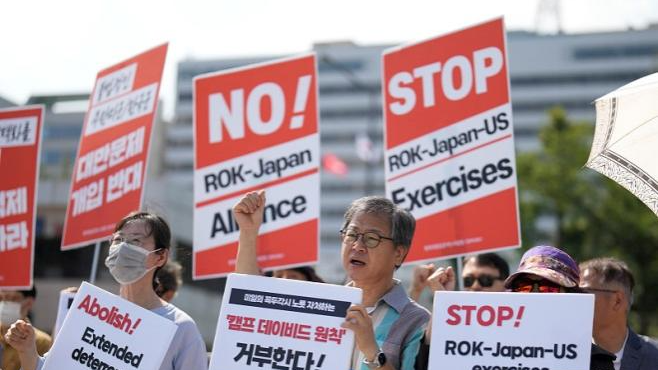
Protesters shout slogans during a rally ahead of the Camp David summit between the U.S. President Joe Biden, South Korean President Yoon Suk-yeol and Japanese Prime Minister Fumio Kishida, in Seoul, South Korea, August 17, 2023. /CFP
Protesters shout slogans during a rally ahead of the Camp David summit between the U.S. President Joe Biden, South Korean President Yoon Suk-yeol and Japanese Prime Minister Fumio Kishida, in Seoul, South Korea, August 17, 2023. /CFP
Editor's note: Gabriela Bernal, a special commentator for CGTN, is a Korean analyst and Ph.D. student at the University of North Korean Studies in Seoul, South Korea. The article reflects the author's opinions and not necessarily the views of CGTN.
The U.S., the Republic of Korea (ROK), and Japan are holding their first-ever standalone trilateral summit at Camp David on August 18. While Washington pushes for closer Seoul-Tokyo ties, however, regional divisions deepen and prospects for long-term stability diminish.
The leaders of the three countries seem to be increasingly on the same page. For one, South Korean President Yoon Suk-yeol has been pushing to improve ties with Japan ever since taking office last year. Despite the many unresolved issues between the two countries, Yoon has vowed to revitalize Seoul-Tokyo relations. He once again highlighted this goal in his Liberation Day speech on August 15, saying South Korea and Japan are "partners who share universal values and pursue common interests." Yoon also praised the upcoming summit, saying it "will set a new milestone in trilateral cooperation contributing to peace and prosperity" for the ROK and the region.
The comments were shocking to many since Liberation Day is when Korea remembers the day it gained independence from Japanese colonial rule. Despite Yoon's comments, South Korea's Foreign Ministry expressed "deep disappointment and regret that responsible leaders of the Japanese government and parliament sent offerings or paid visits to the Yasukuni Shrine that beautifies Japan's past war of aggression." It urged Japan "to look squarely at history and show genuine reflection and repentance on the past through action." Nevertheless, Japanese Prime Minister Fumio Kishida marked the day without making any reference to Japanese aggression during the war.
There is a clear disconnect between the South Korean president and other members of government. While Yoon calls for a trilateral alliance, many South Koreans are waiting for the government to resolve historic issues with Japan. One such issue is Japan's use of forced labor during the war, which forced Koreans to work in Japan against their will.
Although the ROK's Supreme Court ordered Nippon Steel and Mitsubishi Heavy Industries to pay compensation to the Korean victims, Yoon hastily put together an "agreement" earlier this year through which South Korean companies pay reparations to the victims instead. Needless to say the deal was met with major backlash both from government officials and the public. The U.S., on the other hand, praised the agreement as "groundbreaking."

The U.S., South Korea and Japan hold a joint missile defense drill in the international waters of the east coast of Korean Peninsula, February 22, 2023. /CFP
The U.S., South Korea and Japan hold a joint missile defense drill in the international waters of the east coast of Korean Peninsula, February 22, 2023. /CFP
While cooperation itself is not a bad thing, a strategy based on haste and short-term interests cannot be conducive to the long-term peace and prosperity of neither South Korea, nor Japan or the region. In addition, Yoon's policy of isolating other key allies while placing all his eggs in the U.S.-Japan basket does not bode well for South Korea's long-term interests either.
Given its complex geopolitical position, it has always been crucial for the ROK to adopt a balanced diplomatic strategy that promotes multilateral cooperation. To this end, the ROK has actively participated in various multilateral organizations and forums, such as the United Nations, the ASEAN Regional Forum, and the Asia-Pacific Economic Cooperation, to facilitate open dialogue, build trust and forge partnerships.
It is also in Japan's best interests to prioritize a multilateral approach to diplomacy. Instead of focusing on military buildup and military drills with the U.S. and the ROK, adopting a more neutral role while cooperating with various regional and global partners will be conducive to greater stability, security and prosperity both at home and abroad.
While establishing a U.S.-ROK-Japan "bloc" may benefit Washington's national interests, doing so can have negative consequences for South Korea and Japan. In fact, key to achieving regional stability is trilateral cooperation between Seoul, Beijing, and Tokyo. While the U.S. will always push for its own interests anywhere in the world, the ROK and Japan must not forget the need to maintain cooperation with regional partners. While the U.S. can pick up and leave as it sees fit due to its faraway location, this is not the case for the ROK or Japan. As such, Seoul and Tokyo cannot afford to adopt the same kind of risky behavior.
Seoul and Tokyo must keep this in mind during the Camp David summit in order not to jeopardize their own national interests or the long-term stability of the region.
(If you want to contribute and have specific expertise, please contact us at opinions@cgtn.com. Follow @thouse_opinions on Twitter to discover the latest commentaries in the CGTN Opinion Section.)